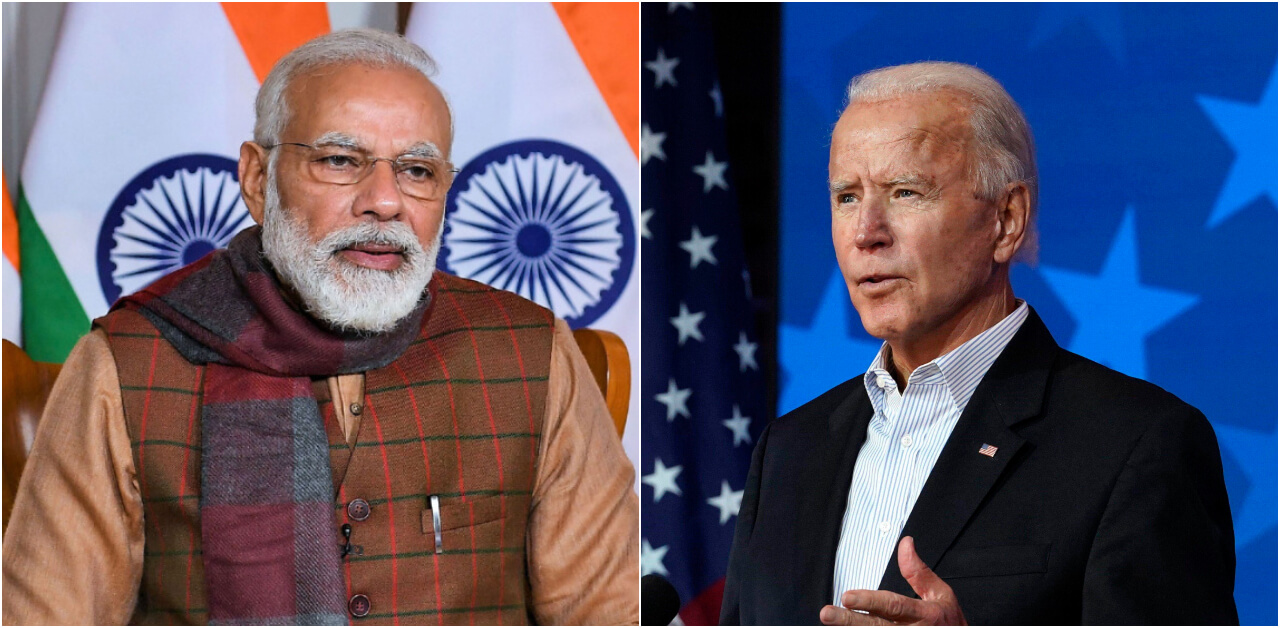Indian Prime Minister Narendra Modi and US President-elect Joe Biden held their first phone call on Tuesday. Modi congratulated Biden and his running mate Kamala Harris—who is of Indian descent—for their election victory, which he said was “a testament to the strength and resilience of democratic traditions in the United States,” and the leaders vowed to work closely to strengthen bilateral strategic ties.
Both sides released a readout of the call, wherein the leaders discussed their “shared priorities and concerns”, which included responding to the COVID-19 pandemic, promoting access to affordable vaccines, strengthening democracy at home and abroad, addressing climate change, and enhancing cooperation in the Indo-Pacific.
It’s worth noting that the issue of “strengthening democracy at home and abroad” was mentioned by the Biden-Harris transition team, but omitted by the Indian Ministry of External Affairs (MEA), which could be a point of friction in the Indo-US relationship, given that Biden’s campaign focused on the two countries leading by example and cooperating on the basis of their shared democratic values—free and fair elections, equality under law, and the freedom of expression and religion.
Both Biden and Harris have expressed disappointment over India’s abrogation of article 370 in Kashmir, the controversial Citizenship Amendment Act (CAA), and the implementation of the National Register of Citizens (NRC) in Assam. “These measures are inconsistent with the country’s long tradition of secularism and with sustaining a multi-ethnic and multi-religious democracy,” Biden said in a statement last year. Furthermore, the grand ‘Howdy Modi’ and ‘Namaste Trump’ events, which have created a perception of closeness between Modi and Trump, could also lead to some turbulence between the parties on these issues.
Also read: What Would a Biden Presidency Mean For US-India Relations?
However, analysts say that the US-India relationship enjoys bipartisan support in Washington, and the US will continue to look at New Delhi as a key strategic ally in countering Chinese aggression. Additionally, with Joe Biden at the helm, America promises to be more liberal, fair, rational, and systematic on matters like immigration, trade, and climate change which would only facilitate closer and more productive relations between the two nations.
In other developments, former President Barack Obama’s memoir ‘A Promised Land’ released on Tuesday, and immediately caused ripples in Indian political circles. The book covers his first term in office, includes a vivid description of his first visit to the (then Congress-led) country in 2010, and his growing concern about the rise of “divisive nationalism touted by the BJP”.
However, it was his less than flattering impression of Congress leader Rahul Gandhi and admiration and respect for former Prime Minister Manmohan Singh that caused a stir in the country, with several leaders weighing on the former President’s comments. Obama speaks of Rahul Gandhi as smart and eager, but having a nervous, unformed quality about him. He describes his mother, Congress President Sonia Gandhi, as a “shrewd person with forceful intelligence,” and former PM Manmohan Singh as “wise, thoughtful and scrupulously honest”. The book is the first of two volumes, and though current PM Narendra Modi did not find mention in the first volume of Obama’s memoir, the former US President is likely to include his first impression of Modi in his subsequent book.

